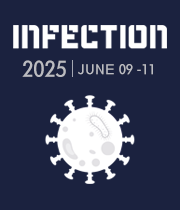Ranjan Ramasamy, IDFISH Technology, United States
Changes in temperature, rainfall and humidity due to global warming affect mosquito-borne disease transmission. However, coastal areas are also influenced by the expansion of brackish water mosquito habitats as a result of global warming leading to higher sea levels and the accum [....] » Read More




















































Title : The role of the humoral innate immune system in evasion of streptococcus pyogenes infections
Francis J. Castellino, University of Notre Dame, United States
The human innate immune system plays a central role in controlling the virulence of Streptococcal pyogenes (GAS) infections. Important participants of the humoral response to these infections are the coagulation, complement, and inflammatory systems. GAS responds to h [....] » Read More
Title : Impressive virologic suppression of SHIV infection with long-term AAV delivery of monoclonal antibodies
Ronald Desrosiers, University of Miami Miller School of Medicine, United States
Antibody-based approaches for the treatment or prevention AIDS virus infection are made possible by an incredible array of monoclonal antibodies (mAbs) with potent neutralizing activity against a broad range of HIV isolates. Most infected people do not make such antibodies but we [....] » Read More
Title : 2000 years of pandemics: Past, present and future
Claudia Ferreira, Biophytis Sorbonne, France
A pandemic is considered as an outbreak of a disease occurring over a wide geographic area, crossing national borders, and affecting a high proportion of the world. During the 1st millennium AD, three main pandemics emerged. The Antonine Plague (165-190 AD), caused by hemorrhagic [....] » Read More
Title : Role of mast cells in infection and inflammation
Pio Conti, University in Chieti, Italy
Mast cells (MCs) originate from CD34+/CD117+/CD13+ pluripotent hematopoietic stem cells and they express the c-Kit receptor (c-Kit-R) which regulates their proliferation and sustains their survival, differentiation, and maturation. MCs are immune tissue cells derived from bone ma [....] » Read More
Title : Effect of glutathione on antibiotic susceptibility and resistance in bacteria
Dong H Kwon, Long Island University, United States
Infections with antibiotic resistance are associated with millions of deaths annually and are a significant healthcare challenge. A new antibiotic or strategy is an urgent priority to reduce antibiotic resistance. Glutathione (GSH) is a biogenic thiol compound for an optimal intr [....] » Read More
Title : A platform for rapid, sensitive detection of aerosolized pathogens in exhaled breath and ambient indoor air
Thomas Cirrito, Varro Holdings, Inc., United States
Respiratory infections are among the top two causes of treat-and-release Emergency Department (ED) visits in the USA. Globally, respiratory infections accounted for ~42.8% of all- cause illnesses in 2019. The combined forces of rapid urbanization, globalization, and easy internat [....] » Read More
Title : Investigation of the HPV 53 E2 protein as a potential treatment for cervical cancer
Carlo Ferrazzano, The University of Manchester, United Kingdom
Human papilloma virus (HPV) types 16 and 18 are the most common cause of cervical cancer where integration-associated loss-of-function of the viral E2 protein promotes malignant progression. HPV type 53 is a low-risk virus which does not promote malignant changes and the current [....] » Read More
Title : Loss of ballance
Kurt E. Muller, Dresden International University, Germany
Most human functional systems are dual organized, with a supporting and a controlling system that maintains the balance of both through feedback mechanisms. In the case of illness, dysregulation is a temporarily necessary process that should end with the restauration of bal [....] » Read More
Title : FawCells, The universal alternative for antibiotics
Fawzy Abdelatty, Heidelberger Center for Cellular Therapy, Germany
FawCells are Methylation Induced Pluripotent Cells which are prepared from peripheral blood samples. For patients, these samples can be obtained from autologous, heterologous or xenographic sources. These cells are very potent in infection prevention and control. They have the po [....] » Read More
Title : Tissue-invasive disease and cytomegalovirus: Cytomegalovirus trigger or killer? Two cases observed in an internal unit
Daniela Tirotta, Morgagni - Pierantoni Hospital in Forlì, Italy
Background: Human cytomegalovirus (CMV) is a Herpesviridae virus with a wide spectrum of pathology in humans. The major determinant of the clinical manifestation of CMV is host immunity and clinical manifestations can vary widely in the pratical setting. Immunocompetent patients [....] » Read More
Title : COVID-19 vaccination strategies in the post-pandemic era
Pedro Plans Rubio, College of Physicians of Barcelona, Spain
COVID-19 vaccines have reduced the negative health and economic impact of the COVID.19 pandemic by preventing severe disease, hospitalizations and deaths. In the new socio-economic normality, the COVID-19 vaccination strategy can be universal or high-risk and seasonal or not seas [....] » Read More
Title : Latin America and the Caribbean consortium: Connecting excellence to enhance the skills base of local research teams in emerging infectious diseases
Fernando Rubinstein, Instituto de Efectividad Clinica y Sanitaria, Argentina
Introduction: To respond to the emerging Zika outbreak, a community of practice (CoP) was created to provide support to implement high-quality, coherent research in affected communities in Latin America and the Caribbean (LAC). The achievements of this CoP laid the groundwork for [....] » Read More
Title : Development of antimicrobial peptides… Rational design of SAMA and HAZ peptides
Mohammad Alsaggar, Jordan University of Science and Technology, Jordan
The rise in microbial resistance to antibiotics represents a significant global public health concern, underscoring the urgent need for novel antimicrobial agents. Antimicrobial peptides (AMPs) have emerged as promising candidates for therapeutic development. In this study, we de [....] » Read More
Title : Universal PCR assays to detect Candida FKS and ERG11 mutations
Cheung Yuk Yam, Hong Kong Metropolitan University, Hong Kong
The emergence of antifungal resistance in Candida species presents significant challenges in managing infections, particularly among immunocompromised patients. This study aimed to develop rapid molecular assays for detecting mutations in the FKS genes across four clinically sign [....] » Read More
Title : Risk factors of mortality and development of a scoring system for predicting mortality among patients with leptospirosis
Goutham Krishna T.C, Government Medical College, India
Background: Leptospirosis, a potentially fatal zoonotic infection, has been on the rise in Kerala, India particularly among individuals involved in water-related occupations and activities. With increasing incidence and mortality rates, there is an urgent need to identify key ris [....] » Read More
Title : Th1/Th2/Th17 cytokine profile among different stages of COVID-19 infection
Gaurav Gupta, AIIMS, India
Aim: to characterize Th1/Th2/Th17 cytokine profile (IL-2, IL-4, IL-6, IL-10, TNF-α, IFN-?, and IL-17A) among different stages of COVID-19 infection. Methods: This was a cross-sectional study which included 6 healthy individuals and 68 patients who were admitted with COVI [....] » Read More
Title : A cohort study of the spectrum of coagulopathy in acute sepsis and its correlation with physiological scores and outcome
Aishwarya Vyas, SMS Medical College, India
Purpose: To evaluate the spectrum of coagulopathy in acute sepsis and to correlate it with sequential physiological scores (SOFA & APACHE II) and compare the findings among survivors and non-survivors. Design: Prospective cohort Methods: It is a prospective [....] » Read More
Title : IPC capacity building- Orientation training for COVID-19 preparedness and IPC for healthcare facilities
Arya S Kumar, Amrita Institute of Medical Sciences & Research Centre, India
Introduction: Infection Prevention and Control (IPC) is crucial in healthcare settings, particularly in light of the COVID-19 pandemic. This study aimed to enhance IPC practices across various healthcare facilities in Kerala, India, marking the first multicenter initiative of its [....] » Read More
Title : Addressing the intersection of long COVID, inflammation, and cancer in the public health care sector of South Africa
Kyrtania Pather, University of the Witwatersrand, South Africa
Long COVID, or post-acute sequelae of SARS-CoV-2 infection (PASC), has emerged as a significant public health concern globally. Characterized by persistent symptoms such as fatigue, chronic inflammation, and immune dysregulation, Long COVID is believed to increase the risk of non [....] » Read More
Title : Cooling tower culprit or community clue? A modern approach to legionella surveillance
Kinta Alexander, New York City Health and Hospitals, United States
Introduction: Legionella disease (LD) is primarily transmitted through the inhalation of aerosolized water droplets containing Legionella bacteria, often originating from water sources such as cooling towers. In August and September 2021, an Infection Prevention team at a New Yor [....] » Read More
Title : Characterization of porcine rotaviruses in the Czech Republic
Romana Moutelikova, Veterinary Research Institute, Czech Republic
Porcine rotaviruses A (RVA) are known for their complex epidemiology, pathogenicity and great genetic diversity. From a veterinary point of view, RVA represents one of the most important causes of acute diarrhoea of young animals. Apart from the first days of life, piglets are at [....] » Read More
Title : Tubercular disease in children: Optimizing treatment strategies through disease insights
Elena Chiappini, University of Florence, Italy
Background: Paediatric tuberculosis (TB) represents a critical health concern due to the significant risk of extrapulmonary TB (EPTB), severe disease forms, and the increasing prevalence of drug-resistant strains (DR-TB). Understanding the clinical characteristics of affected chi [....] » Read More
Title : Novel antibiotic adjuvant exerts potent antimicrobial activity against MRSA and synergistically restores colistin activity in MDRO
Susu Zughaier, Qatar University, Qatar
Background: The rise in global burden of antimicrobial resistance (AMR) critically threatens human health. Multidrug resistant organisms (MDROs) are causing healthcare and community-acquired infections. In 2019, AMR of pathogens such as Escherichia coli (E .coli) and Staphylococc [....] » Read More
Title : Systems vaccinology
Nadine Rouphael, The Hope Clinic of Emory University, United States
Vaccines are among the most transformative public health tools, yet translating findings from animal models to humans poses challenges. Translational immunology bridges basic science and clinical applications, fostering advancements like systems vaccinology. This systems-based ap [....] » Read More
Title : Innovative sensor for rapid sepsis detection using Raman Spectroscopy
Manal Hassan, Qatar University, Qatar
Background: Sepsis being one of the leading causes of mortality and hence causing a burden on the healthcare system without a standard detection test. Therefore, this in turn delays the time to detection leading to non-responsive empirical treatment options. The huge burden [....] » Read More
Title : Invasive fungal sinusitis, correlation of the radiological and intraoperative findings
Nikrish S Hegde, Indian Radiological and Imaging Association, India
Acute invasive fungal sinusitis though uncommonly encountered, is a life threatening condition with a high mortality rate. It progresses rapidly from the time of diagnosis and may result in death in a short span of time if left untreated. Here we present the MRI / CT imaging find [....] » Read More
Title : Profiling of human IL-22+ T cell clones from patients affected with schistosoma mansoni: Insights into macrophage regulation and liver fibrosis
Fernanda Scopelliti, National Institute for Health, Italy
Tissue damage caused by Schistosoma mansoni infection is primarily due to a granulomatous, T-cell-mediated response to eggs, which ultimately leads to liver fibrosis and portal hypertension. In the early phase of infection, the immune response is dominated by Th1 lymphocytes; how [....] » Read More
Title : Overlooked possible menace to life also known as PML
Alejandro Carmona Casillas, University of Puerto Rico, Puerto Rico
Introduction: Progressive Multifocal Leukoencephalopathy (PML) is a relatively rare manifestation of immunosuppressed patients due to medication or diseases such as HIV/AIDS. PML arises from the reactivation of the human polyomavirus, more commonly known as JC virus. Over th [....] » Read More
Title : Microbiological activity of bovhyaluronidaze azoximer against microbial biofilms
Roman Kozlov, Smolenks State Medical University, Russian Federation
Background. Biofilm-related infections are most often characterized by low susceptibility to treatment due to the difficulty of antibiotics penetration into the biofilm. This fact repeatedly increases the level of antimicrobial resistance (AMR). In turn, the spread of AMR signifi [....] » Read More
Title : Prevalence and determinants of acute stress disorder among COVID-19 survivors during the pandemic’s final phase: A cross-sectional study in seven major Chinese cities
Ziying Yang, Sun Yat-sen University, China
Background: Acute stress disorder (ASD) is commonly observed among individuals who have been infected with COVID-19 (PEIC) and may progress to post-traumatic stress disorder. Following the relaxation of COVID-19 control measures in China during November/December 2022, the infecti [....] » Read More
Title : A single center retrospective study on the incidence and clinical outcomes of patients infected with Klebsiella Pneumoniae Carbapenemase (KPC)-producing klebsiella pneumoniae
Kevin Cezar A. Estacio, Dr. Paulino J. Garcia Memorial Research Medical Center, Philippines
Introduction: Currently, one of the most significant nosocomial pathogens is Klebsiella pneumoniae strains that produce carbapenemase, in fact it is one of the most prevalent carbapenemase genes worldwide. Its rise also become a major global public health concern, and the be [....] » Read More
Title : False-negative HIV antibody test results in a patient with advanced HIV disease – related disseminated histoplasmosis
Maria Venice Velasco Atienza, Philippine Society of Microbiology and Infectious Diseases, Philippines
Background: Disseminated or extrapulmonary histoplasmosis is seen in patients with impaired T- lymphocyte function. As one of the AIDS-defining conditions, the diagnosis of histoplasmosis is an indication to recommend HIV screening and testing. Case: We report a case of a [....] » Read More
Title : Incidence of acute pancreatitis among patients with moderate to severe leptospirosis and its clinical outcomes: A single center retrospective study in a tertiary hospital
Karizza Angeles, Dr. Paulino J. Garcia Memorial Research Medical Center, Philippines
Introduction: Acute pancreatitis is considered as an uncommon complication of leptospirosis. However, literatures suggested that this condition still occurs among leptospirosis patients. This study aims to determine the incidence of acute pancreatitis in moderate [....] » Read More
Title : Mpox in patients seen at the research institute for tropical medicine: A case series
L. Angelique Gene E. Duran, Research Institute for Tropical Medicine, Philippines
Background: WHO declared the Mpox outbreak as a public health emergency of international concern twice in 3 years, in July 2022 and August 2024. To date, the Philippines has reported 15 confirmed cases. We described the demographics, clinical presentations, transmission ris [....] » Read More
Title : Exploring the antibacterial efficacy of adam series compounds against multidrug-resistant clinical isolates
Balsam Qubais Saeed, University of Sharjah, United Arab Emirates
Antibiotics significantly reducing morbidity and mortality from bacterial infections. The spread of antibiotic-resistant bacteria has become a pressing global health, endangering the effectiveness of our most potent antibiotics. This study investigates the antibacterial efficacy [....] » Read More
Title : Real-world effectiveness of therapeutic plasma exchange in patients with severe fever with thrombocytopenia syndrome
Hyun Ji Woo, Jeonbuk National University Hospital, Korea, Republic of
Severe Fever with Thrombocytopenia Syndrome (SFTS) is a life-threatening infectious disease for which no standardized treatment has been established. Observational studies have suggested that therapeutic plasma exchange (TPE) may enhance survival outcomes in patients with SFTS. H [....] » Read More
Title : Atypical lemierre syndrome in an infant presenting as neck abscess: A rare case report
Vaishnavi Sreenivasan, Vardhman Mahavir Medical College and Safdarjung Hospital, India
Lemierre syndrome, a rare life-threatening complication of anaerobic oropharyngeal infection initially described in 1936, has now emerged as a subject of interest in the era of antimicrobial resistance. This syndrome is characterized by primary infection originating from the ear [....] » Read More
Title : The implementation and outcomes of an Iiclusion health program to improve the care of people who use substances with invasive infections presenting to a tertiary health service in Melbourne
David Martyn Lloyd-jones, Alfred Health, Australia
The Inclusion Health Program was set up to develop a model of care for people who inject drugs and who have developed acute infections. The aim of the program is to improve both the patient and the healthcare provider experiences by improving healthcare outcomes (treatment comple [....] » Read More
Title : Genomic epidemiology-informed phage therapy: Tackling acinetobacter baumannii infections in Eastern and Southern Europe
Hadj Mehdi Hiba, HUN-REN Biological Research Centre, Hungary
Phage therapy is gaining significant interest in combating critically antibiotic-resistant nosocomial pathogens. However, the narrow host range of bacteriophages limits the development of broadly effective therapies, necessitating precision approaches. In this study, we integrate [....] » Read More
Title : Wastewater surveillance for emerging viruses
Samendra Sherchan, Morgan State University, United States
Since it was declared a pandemic by the World Health Organization in March 2020, SARS-CoV-2 has been known to exhibit notoriety due to the number of people infected and dead over a period of three years. This study was to determine the presence of SARS-CoV-2 RNA viral fragments i [....] » Read More
Title : Eastern equine encephalitis: A rare case with minimal drama in brain’s theater
Shanmukha Priya Peddireddy, Nuvance Health, United States
Introduction: Eastern Equine Encephalitis (EEE) is a rare zoonotic viral disease caused by the Eastern Equine Encephalitis Virus (EEEV), which belongs to the Togaviridae family. While human infections are uncommon, they carry a high mortality rate of approximately 33%. Survivors [....] » Read More
Title : Malaria mimicker: Babesia on the rise
Razan Al Sharkawi, Dalhousie University, Canada
Introduction: Babesiosis is a parasitic infection caused by the protozoan of the genus Babesia. In North America, the most common disease-causing species is Babesia microti, and the primary vector is Ixodes scapularis, also known as the black-legged or deer tick. Babesia microti [....] » Read More
Title : Efficient removal of antibiotics from water using a highly crosslinked metal-alginate system; A novel strategy to fight against antimicrobial resistance
Nicole Azizeh, Kingston University London, United Kingdom
ATBs are substances designed to kill or inhibit the growth of bacteria on or within the body. This makes ATBs essential substances to treat infectious diseases caused by bacteria. The discovery of antibiotics (ATBs) marked one of the greatest medical achievements in history, savi [....] » Read More
Title : Clinical trials of the fully automated nucleic acid testing system (LabGenius) for VRE infectious disease
Ah-reum Park, Biomedux Co, Korea, Republic of
LabGenius is a newly developed in Biomedux Co(Republic of Korea) for Fully Automated Nucleic Acid Testing System(FANATS). It can be operated as, so-called, Sample-to-results, a Point of care Testing. Using this FANATS, we have performed the clinical trials to assess clinical sens [....] » Read More
Title : Clinical trials of the fully automated nucleic acid testing system (LabGenius) for CT/NG STI diseases
Hye Ji Yang, Biomedux Co, Korea, Republic of
LabGenius is a newly developed in Biomedux Co(Korea) for Fully Automated Nucleic Acid Testing System(FANATS). It can be operated as so-called, sample-to-results, a Point of care Testing. Using this FANATS, we have performed for clinical trials for CT/NG STI infection disease at C [....] » Read More